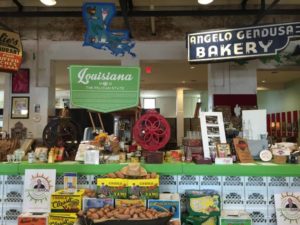It may be hard to believe, but my time with SoFAB is more than halfway done. When I realized that last week, I freaked out. I thought of all the people I still needed to contact, the captions I needed to write, and the artifacts I had yet to collect. So, in a caffeine-induced panic, I sent out (what felt like) a million emails to museums, archives, restaurants, and historians.
However, after talking to my colleagues, we realized that we were all in the same boat. So, like all good interns do, we raided the fridge in the demonstration kitchen and took an extra-long lunch break. As we sat around munching on leftover tres leche cake and macaroons, we started to talk about current events.
We’d all heard about what happened to Alton Sterling two weeks ago, but the recent murder of three police officers in Baton Rouge added to our outrage. It hit me especially hard. I’ve always been proud of the fact that I’m from Baton Rouge; I take pride in football and Mardi Gras, jazz and gumbo. It was hard for all of us to believe that something so horribly violent, racist, and hate-induced could happen so close to home. But we talked about it. We discussed the importance of the Black Lives Matter Movement, criticized the violence within our communities, and brainstormed ways to improve public safety.
Some people may say that public historians shouldn’t discuss current issues—that we have no business talking about police brutality, systemic racism, and violence in our communities. However, I disagree. Public historians may love the past, but we certainly don’t live there. My job is to make history accessible, interesting, and relatable. And the only way we can do that is by discussing current problems, interacting with our communities, and being open to change. So, yes, captions and artifacts and emails are all really important, but so are Alton Sterling and those three police officers who were murdered while trying to serve their community.
